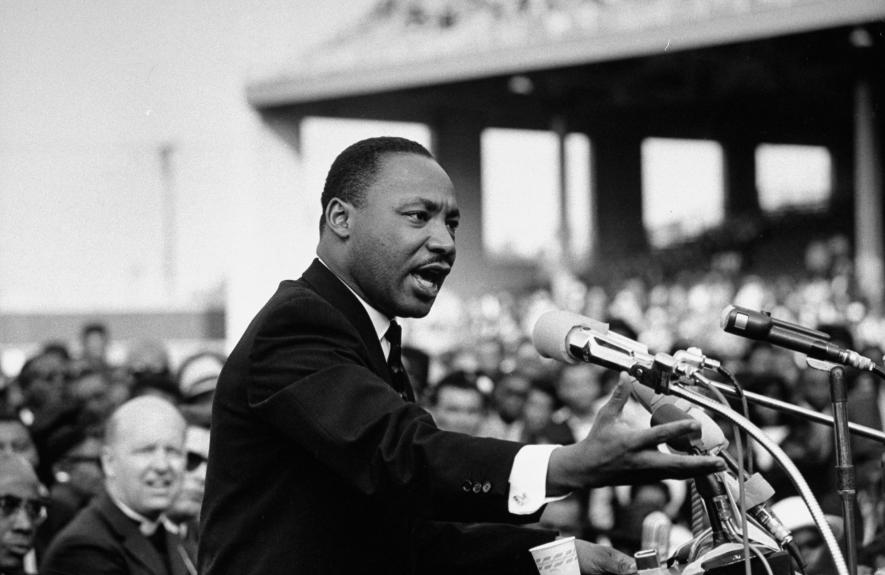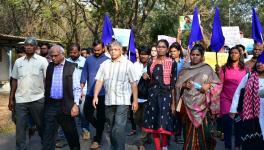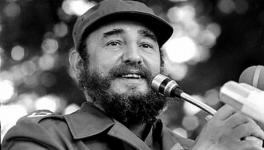50 Years After His Assassination, Dr. King's March Continues

Image Courtesy: Time Magazine
Death, and capitalism, has a perverse way of stripping complex, revolutionary figures of their context and reducing them into cardboard cutouts, standing for largely non-threatening and palatable values. Dr. Martin Luther King Jr., who fell victim to an assassin's bullet exactly 50 years ago, was throughout his activist career abused, attacked, arrested and jailed by the establishment but is now sought to be presented as an American role model for global peace and goodwill. 'I have a Dream' has been marketed as a slogan of aspiration at worst and an apolitical desire for social harmony at best.
Dr. King of course was much more than that. He was a tenacious critic of overlapping and interconnected systems of exploitation that often pitted the poor against each other while a few benefited. He saw that the ravages of imperialism were experienced not just in Vietnam but in communities across the United States as well. As he eloquently put it in his famous 'Beyond Vietnam' speech:
A true revolution of values will soon look uneasily on the glaring contrast of poverty and wealth. With righteous indignation, it will look across the seas and see individual capitalists of the West investing huge sums of money in Asia, Africa, and South America, only to take the profits out with no concern for the social betterment of the countries, and say, “This is not just.” It will look at our alliance with the landed gentry of South America and say, “This is not just.”
A descendant of slaves and sharecroppers, he was keenly aware of the economic underpinning of racial discrimination. Among the key demands of the March to Washington in 1963, where he made his iconic 'I have a Dream' speech, was a minimum wage of $2 (around $16 by 2017 standards). His last speech was in Memphis, Tennessee, where he had gone in support of a strike by sanitation workers. In fact, throughout his career, as historian Michael K. Honey has pointed out, Dr. Martin Luther King was a man of the unions. In 1961, speaking at the 4th Constitutional Convention of the AFL-CIO, he said:
Our needs are identical with labor's needs: decent wages, fair working conditions, livable housing, old-age security, health and welfare measures, conditions in which families can grow, have education for their children, and respect in the community...The duality of interests of labor and Negroes makes any crisis which lacerates you a crisis from which we bleed.
For Dr. King, this lifelong commitment to justice in all its forms took the shape, in his final months, of the Poor People's Campaign, an ambitious campaign that signified a shift from a “reform movement” to an “era of revolution.” It would be a movement that encompassed all those stricken by poverty and turn them into a “new and unsettling force”. The Southern Christian Leadership Conference, led by Dr. King, planned to target the poverty in the slums of northern cities and challenge the Vietnam War as the greatest impediment to combating poverty. The campaign, which sought comprehensive political and economic rights for all citizens, continued for months after Dr. King's assassination.
The many battles of Dr. King are of utmost relevance in today's age as imperialism continues to drag countless young men and women to their deaths in wars fought over resources that are ultimately used for the benefit of the few. His call for solidarity among the exploited resonates doubly amid concerted attempts to use economic crises to fan the flames of hatred and divide communities. In the United States, a coalition of organisations have taken up the torch, launching a renewed Poor People's Campaign, making a call for moral renewal. Organisations working on causes as diverse as minimum wage, the right to water, accessible health care, labour rights, along with religious leaders, have come together to plan '40 days of resistance' – involving civil disobedience actions on issues, including poverty, racism, environmental destruction and militarism from May 13.
Reverend Liz Theoharis, co-chair of the campaign, sees it working to .. “turn those reactive fights into a proactive, larger network and battle, and coalition particularly focused on political education, on leadership development… Because we know that we’re up against a very formidable, very powerful force, whether that’s the United States or global capitalism”, while Willie Baptist of the campaign sees it as part of a global struggle, one of “unite[ing] with the poor and dispossessed in the United States, in the belly of the system, and combine[ing] our struggles with all the other struggles.”
The modern-day Poor People's Campaign is yet another indication that 50 years later, Dr. King's legacy of resistance to oppression and exploitation remains strong. The march towards a just and equitable society continues.
Get the latest reports & analysis with people's perspective on Protests, movements & deep analytical videos, discussions of the current affairs in your Telegram app. Subscribe to NewsClick's Telegram channel & get Real-Time updates on stories, as they get published on our website.
























